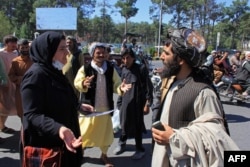The Taliban have weakened and censored the media inside Afghanistan, but their communications faults and governance shortcomings still receive widespread exposure on social platforms.
Last week, the U.N. Assistance Mission in Afghanistan (UNAMA) dismissed as false a statement made by Khalid Hanafi, who runs the Taliban's Ministry for Propagation of Virtue and Prohibition of Vice.
"Yesterday we had a meeting with UNAMA and when we explained to them the fostering of virtues, they said this fostering of virtue is also needed in Europe," Hanafi had said in a video widely circulated on social media.
"UNAMA has, of course, said no such thing," the U.N. mission said in a tweet.
"Never would I say that," Markus Potzel, deputy head of UNAMA, tweeted separately.
Last month, the Taliban's former education minister, Noorullah Munir, claimed that in some parts of the country parents were not allowing their teenage girls to attend secondary schools.
In reality, the Taliban have closed secondary schools for girls, saying only religious scholars can decide when and whether they can be reopened.
Such statements by Taliban officials are not exceptional.
"The Taliban have a long history in spreading disinformation," Wahed Faqiri, an Afghan American analyst, told VOA.
Until July 2015, the Taliban issued misleading public statements in the name of their supreme leader, Mullah Mohammad Omar, whose death in April 2013 had been kept secret, Faqiri said.
The Taliban have confirmed covering up Omar's death for over two years but said they did so out of strategic necessity, as they were fighting U.S. and NATO forces in Afghanistan.
Invisible rulers
Under the Taliban, the once flourishing Afghan media have suffered major losses.
Up to 80% of female Afghan journalists have lost their jobs and the rest face serious restrictions, such as being required to wear a face mask while presenting programs on television.
In recent years, more than 215 of the country's 540 media outlets have closed because of financial, social and political problems, according to the organization Reporters Without Borders.
"We can't even see the Taliban leader, so how can we report factually on his leadership and decisions?" said one senior Afghan journalist in Kabul, who preferred anonymity out of fear he could be targeted by the Taliban.
The Taliban's current supreme leader, Hibatullah Akhundzada, has not appeared in public since assuming the position. Akhundzada's appointed chief minister and his deputies, while seen in officially released videos, have not appeared in any media interviews to answer questions about their governance.
"Communication in the Taliban regime is one way. They just say what they want to say, but never answer our questions," said the Afghan journalist.
While Taliban officials claim their leadership is more accountable and popular than that of the former Afghan Republic, independent surveys conducted in the country present a different picture.
The Taliban's return to power in Afghanistan has led to "unprecedented" suffering among Afghans, according to a recent Gallup poll, which said 94% of Afghans "rated their lives poorly enough to be considered suffering."
Before the Taliban seized power, about 85% of Afghans said they had no sympathy for the Taliban, according to the 2019 survey of Afghanistan by the Asia Foundation.
Fact-checking
This week, UNAMA sent a team to Panjshir Province in the north of Afghanistan to authenticate allegations of serious human rights violations by Taliban fighters.
The U.N. delegation was deployed after purported videos of Taliban gunmen shooting at prisoners of war surfaced on social media.
Some Taliban officials have flatly denied human rights violations in Panjshir and other parts of the country, but UNAMA has said, "Reports of alleged killing of detainees by Taliban appear credible."
Given the losses suffered and restrictions imposed on Afghan media, the U.N. is often perceived as the only credible authority to fact-check and report major events in Afghanistan.
"Journalists and researchers mainly depend on the online medium [primarily vibrant social media] and local personal contacts for authenticity check of news, but that is a complicated process, unfortunately not possible for every journalist and researcher," Abdul Sayed, a Sweden-based independent researcher on jihadism in Afghanistan and Pakistan, told VOA.
None of the Taliban's numerous official accounts on social platforms is verified, as U.S.-based providers such as Google, Meta and Twitter deny Taliban platforms.
There are also numerous fake and anonymous social accounts often spewing lies and disinformation, which sometimes mislead even credible media outlets. On Monday, several media outlets ran a correction after initially reporting an explosion in the south of Kabul, attributing the information to social media. There was no explosion.









